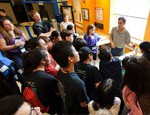Category Science & Technology
Ohio middle, high school teams top National Science Olympiad
A team of middle-school students from Solon Middle School, Solon, Ohio, and a team of high-school students from Solon High School, also of Solon, Ohio, took top honors in the 2011 Science Olympiad National Tournament, held Saturday, May 21 on the University of Wisconsin–Madison campus.
Human brain’s most ubiquitous cell cultivated in lab dish
Pity the lowly astrocyte, the most common cell in the human nervous system.
Liquid crystal droplets discovered to be exquisitely sensitive to an important bacterial lipid
In the computer displays of medical equipment in hospitals and clinics, liquid crystal technologies have already found a major role. But a discovery reported from the University of Wisconsin–Madison suggests that micrometer-sized droplets of liquid crystal, which have been found to change their ordering and optical appearance in response to the presence of very low concentrations of a particular bacterial lipid, might find new uses in a range of biological contexts.
Watch National Science Olympiad opening, closing ceremonies via livestream
To: Media representatives From: Renee Meiller, 608-262-2481, meiller@engr.wisc.edu RE: TIP/WATCH NATIONAL SCIENCE OLYMPIAD OPENING, CLOSING CEREMONIES VIA LIVESTREAM
Curiosities: Why are some crops planted in spring and others in fall?
Temperature sensitivity is the primary determinant in when crops can be planted, says horticulture professor Irwin Goldman. For most fruit and vegetable crops in…
Public opportunities abound at National Science Olympiad Tournament
The public will have many opportunities to experience a massive showcase of hands-on science when the National Science Olympiad Tournament rolls into the University of Wisconsin–Madison on Wednesday-Saturday, May 18-21.
UW Sea Grant funding Winnebago system research on VHS fish disease
Four years after the deadly fish disease viral hemorrhagic septicemia (VHS) was first diagnosed in Wisconsin, researchers are returning to the Lake Winnebago system, the site of that discovery, to learn if the virus is still a threat and to develop a faster, cheaper test to detect its presence as a management tool.
Undergraduate biology research symposium at Union South
More than 340 undergraduate biology students will present their research at the Introductory Biology Research Symposium on Thursday, May 5, from 5-7 p.m. in Varsity Hall in the new Union South.
UW-Madison biology program marks 50 years with special conference
The Cellular and Molecular Biology (CMB) graduate program at the University of Wisconsin–Madison has too much science to fit into a single department.
Antarctic neutrino telescope celebrates completion with conferences, public events
Like the billions of tiny neutrinos that zip through the Earth every second, scientific exchanges will be flying thick and fast in Madison.
Astronomy technique could help assess deadly melanomas
As a young graduate student with a passion for surfing, Andy Sheinis soaked up a lot of California sun.
Symposium to focus on reprogramming, stem cell fate
The sixth annual Wisconsin Stem Cell Symposium, Reprogramming and Controlling Stem Cell Phenotype, will be held April 27 at Madison’s BioPharmaceutical Technology Center Institute.
Intersection of neuroscience, religious practice examined in April 28 symposium
Deepening the dialogue between scholars of contemplative religious practice and neuroscientists interested in the effect of those regimens on the brain is the focus of…
Forum considers human consciousness
The 10th annual International Bioethics Forum, Manifesting the Mind, will explore perspectives on human consciousness at its two-day symposium April 28-29.
University biomedical emphasis a big economic winner for Wisconsin
As Wisconsin struggles with unemployment and anemic growth, a group of health-related university spin-offs continues to benefit from UW–Madison's profound depth in biological sciences, medicine and engineering.
Curiosities: Is anything harder than diamond?
People have made that claim, but the verdict is not in, says Don Stone, a professor of materials science and engineering at the University of…
Precipitation, predators may be key in ecological regulation of infectious disease
A little information can go a surprisingly long way when it comes to understanding rodent-borne infectious disease, as shown by a new study led by John Orrock from the University of Wisconsin–Madison.
Book series explores chemistry’s panache
When chemistry’s preeminent impresario Bassam Shakhashiri mounts the dais, you know the show is about to begin.






